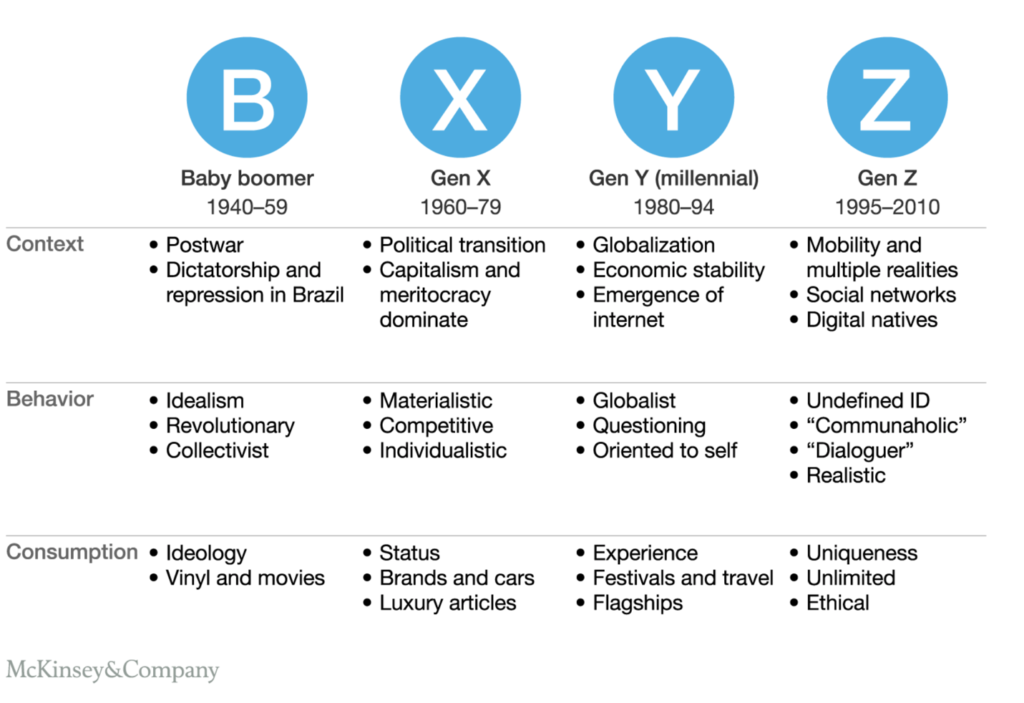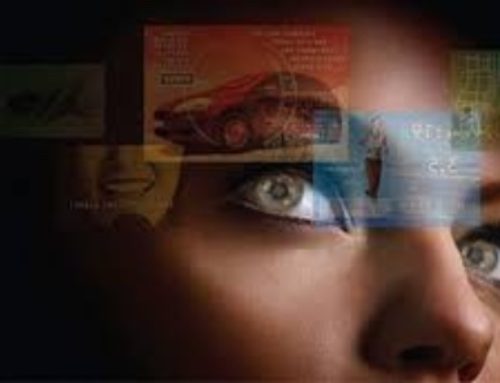By drawing on studies from McKinsey, EY, Deloitte and Pew I’ll shed some light on the newest generational cohort, a group that differs in significant ways from its predecessors. Gen Z is the first generation of true digital natives and their influence is now starting, with the search for truth at the center of behavior and consumption. Technology has given them an unprecedented degree of connectivity among themselves and with the rest of the population. Unlike the Millennials – who came of age during the Great Recession – Gen Z was in line to inherit a strong economy with record-low unemployment until COVID-19 reshaped the landscape. Now, Gen Z now peers into an uncertain future.
Importance of Generational Cohorts
Generational cohorts are based on the idea that generations are shaped by the context in which are born and come of age. Baby Boomers were immersed in a post–World War II context and consumption came to represent an expression of ideology. Gen Xers seemed to consume status, while Millennials seemed to consume experiences and Gen Z seems to consume the search for truth on an both individual and a group level. As global connectivity soars, cohorts may come to play a more important role in setting behavior than socioeconomic differences. Young people have become a potent influence on people of all ages and incomes, as well as on the way those people consume and relate to brands. Revolutionizing technologies now enable new cohorts to influence the consumer landscape in a way that cuts across the whole demographic pyramid.

Meet Gen Z: 1995-2010, 24.3% of U.S. Population
- The oldest were 4 years old when Columbine happened. School was never a safe haven; it became a place of metal detectors and lockdown drills.
- Many started kindergarten days before 9/11. Terrorism and war are real, and the fear is embedded in their psyche.
- Most of Gen Z experienced the Great Recession and the highest unemployment since the Great Depression. They saw families or friends lose jobs, homes and livelihoods.
Gen Z are our first true digital natives having been born into a strong internet with vibrant and diverse social networks and mobile systems. They are a hypercognitive generation that is comfortable with collecting and cross-referencing many sources of information and with integrating virtual and offline experiences. McKinsey research suggests that the driving force of this generation is the search for truth. They value individual expressions, avoid labels, believe in the efficacy of dialogue to solve problems, mobilize for various causes and take a highly analytical and pragmatic approach to making decisions about purchases and institutions. This is in contrast to the Millennials who got their start in an era of economic prosperity and are more idealistic, confrontational and less willing to accept diverse points of view.
According to studies led by the Pew Research, Gen Z is the most ethnically and racially diverse generation in history: One in four is Hispanic, 14% are African-American and 6% are Asian. Their views on gender and identity are unprecedented and untraditional, and they refuse to turn ethnicity and race into checkboxes.
Across a number of measures, Gen Zers and Millennials stand out from older generations. Roughly half of Gen Zers (48%) and Millennials (47%) say gay and lesbian couples being allowed to marry is a good thing for our society vs. one third of Gen Xers and one-quarter of Boomers (27%). They also agree that people of different races marrying each other is good for society. (Pew).
According to a recent McKinsey study, three drivers define the generation:
- consumption as access rather than possession;
- consumption as an expression of individual identity;
- and consumption as a matter of ethical concern.
Some people call Gen Z identity nomads, because they resist defining themselves by only one stereotype and like to experiment with different ways of being themselves and shape their identities over time. Gender fluidity accepted. Gen Zers are much more likely than those in older generations to say they personally know someone who prefers to go by gender-neutral pronouns, with 35% saying so, compared with 25% of Millennials, 16% of Gen Xers, 12% of Boomers and just 7% of Silents (Pew Research). They seem more interested than previous generations have been in human rights; in matters related to race and ethnicity; in lesbian, gay, bisexual, and transgender issues; and in feminism (McKinsey).
Gen Zers are always connected and frequently evaluate tons of information and influences. They are radically inclusive and tend not to distinguish between friends they meet online and friends in the physical world. They continually flow between communities and think it is natural for individuals to belong to different groups and move between groups.
This is also a very tolerant group. They are able to interact with institutions that reject their personal values without abandoning those values, believe that change must come from dialogue and are also more willing to accommodate the failings of companies. Their belief in dialogue comes from a high value for individual identity, the rejection of stereotypes, and a considerable degree of pragmatism. Gen Zers, with vast amounts of information at their disposal, have become more pragmatic and analytical about their decisions than members of previous generations.
This is a generation of self-learners that is more comfortable absorbing knowledge online than in traditional institutions of learning.
Consumption
The core of Gen Z is the idea of manifesting individual identity. Consumption therefore becomes a means of self-expression—as opposed, for example, to buying or wearing brands to fit in with the norms of groups.
Gen Z expects to access and evaluate a broad range of information before making a purchase. They analyze what they buy and also the very act of consuming. Consumption means having access to products or services, not necessarily owning them. As access becomes the new form of consumption, unlimited access to goods and services (such as car-riding services, video streaming, and subscriptions) creates value. Products become services, and services connect consumers.
Gen Z consumers are mostly well educated about brands and the realities behind them. When they are not, they know how to access information and develop a point of view quickly. If a brand advertises diversity but lacks diversity within its own ranks, for example, that contradiction will be noticed. In fact, members of the other generations we surveyed share this mind-set. According to McKinsey, 70% say they try to purchase products from companies they consider ethical and 65% try to learn the origins of anything they buy—where it is made, what it is made from, and how it is made. About 80% refuse to buy from companies involved in scandals, and they are tolerant of brands when they make mistakes, if the mistakes are corrected.
An Emerging Force
Although most are not yet old enough to vote, the oldest turns 25 this year. They will soon surpass Millennials as the largest generation on earth. They are on the verge of entering the workforce (at a time when the workforce is shrinking) and spending money. While money and salary matter a lot, they have other values they hold dear, and want to align with organizations that share those values. Diversity matters more to them than anyone. The impact of their entry into society will be profound affecting the workplace, consumption, technology, politics and culture. Different from Millennials, they bring a unique perspective on how to define success in life and the workforce, and is a group we need to closely watch and understand.
FACT FOR THOUGHT
$1.4 BILLION
The advertising budget of Geico, America’s most advertised brand.
Advertising Age
Enjoying Overhead Space? There’s More to Love.
Subscribe to Overhead Space to receive mind-expanding content that helps you connect the dots in new ways.




